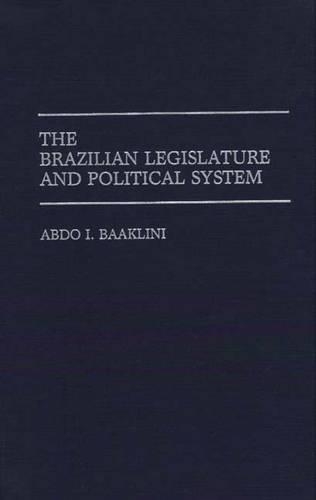
The Brazilian Legislature and Political System
(Hardback)
Publishing Details
The Brazilian Legislature and Political System
By (Author) Abdo I. Baaklini
Bloomsbury Publishing PLC
Praeger Publishers Inc
22nd July 1992
United States
Classifications
Tertiary Education
Non Fiction
Central / national / federal government
981.06
Physical Properties
Hardback
256
Description
The Brazilian experience is a pace setter in the transition from an authoritarian regime to the establishment of stable and democratically responsible political institutions. This study addresses important issues regarding the role of executive and congressional bureaucracies in the system of government. The report opens with a brief history of the presidential system of government in Brazil, a description of political parties, and the bureaucracy. The first chapters show how the military regime tried to reformulate the political system and how these changes affected Congress and its ability to discharge constitutional mandates. The next chapters analyze the congressional bureaucracy, its modernisation of informational capabilities, and go into the work of Congress in detail. The final chapters examine changes in Congress when developing new policy and when drafting a new constitution. The study closes with a discussion of the main characteristics of the new constitution and an assessment of the overall performance of Congress and the presidential system in Brazil. This inside analysis is based on decades of field work and is intended for students of comparative government, public policymaking, and Latin American studies.
Reviews
"There is no other book like this. It is very useful for understanding the Brazilian military regime and how Brazil emerged from it. The author, because of long association through a research project of his university with the Brazilian Congress, is in a unique position to study it in depth."-Robert Alexander
Like many recent books on Brazil, Baaklini's became outdated before it ever went to press. Nonetheless this reviewer can still strongly recommend it to constitutional and congressional analysts in general and to Brazilianists in particular. Although the author gives short shrift to the country's history in only ten pages, he does considerably better in his examination of the presidential and authoritarian strains in recent Brazilian history. He does best of all in his study of the Brazilian Congress (leadership, staffing, performance, behavior, functions). Baaklini's discussion of the 1988 constitution, the first such charter enacted since the opening of the Brazilian system after more than two decades of authoritarianism, is balanced but dry. Wide use of tables enhances the volume's conclusions, and the bibliography, though not as comprehensive as one might expect, is adequate. One could quibble with some of the analysis, but ideological disputes are kept to a minimum. This work will be of value for those doing research on Brazilian politics and those who wish to become better acquainted with one case of transition to democracy. One caveat: the author's sparse and flat style hampers readability, even for someone interested in a scholarly discussion of the parliamentary and the presidential forms of government. All the same, if the political calendar is respected in 1993, the largest Latin American country will vote on its form of government; thus, there is sufficient reason to say that this book is essential reading. Graduate; faculty.-Choice
"Like many recent books on Brazil, Baaklini's became outdated before it ever went to press. Nonetheless this reviewer can still strongly recommend it to constitutional and congressional analysts in general and to Brazilianists in particular. Although the author gives short shrift to the country's history in only ten pages, he does considerably better in his examination of the presidential and authoritarian strains in recent Brazilian history. He does best of all in his study of the Brazilian Congress (leadership, staffing, performance, behavior, functions). Baaklini's discussion of the 1988 constitution, the first such charter enacted since the opening of the Brazilian system after more than two decades of authoritarianism, is balanced but dry. Wide use of tables enhances the volume's conclusions, and the bibliography, though not as comprehensive as one might expect, is adequate. One could quibble with some of the analysis, but ideological disputes are kept to a minimum. This work will be of value for those doing research on Brazilian politics and those who wish to become better acquainted with one case of transition to democracy. One caveat: the author's sparse and flat style hampers readability, even for someone interested in a scholarly discussion of the parliamentary and the presidential forms of government. All the same, if the political calendar is respected in 1993, the largest Latin American country will vote on its form of government; thus, there is sufficient reason to say that this book is essential reading. Graduate; faculty."-Choice
Author Bio
ABDO I. BAAKLINI is Director of the Center for Legislative Development, Nelson A. Rockefeller College of Public Affairs and Policy, State University of New York at Albany. He is the author of Comparative Legislative Reforms and Innovations (1977) and has long been engaged in research about legislatures in South America and Eastern Europe.
